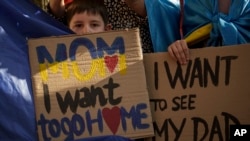A recent study by the U.N. refugee agency warns that millions of Ukrainian refugees and internally displaced people face an uncertain future as Ukraine enters its third year of war with Russia and its battle for survival risks becoming a protracted crisis.
“After two years of full-scale war in Ukraine, amidst massive destruction and ongoing shelling and missile attacks across the country, the future for millions who have been displaced remains shrouded in uncertainty,” Philippe Leclerc, the UNHCR regional director for Europe, said on Tuesday.
Speaking in Athens, Greece, Leclerc told journalists in Geneva that preliminary findings from the study indicate that the majority of those surveyed expressed a desire to return home one day. He noted, however, that “the proportion has declined, with more expressing uncertainty due to the ongoing war.”
The UNHCR study is based on interviews conducted in January and February with some 9,900 Ukrainian refugees, internally displaced and returnee households inside and outside the country.
Leclerc said, “Those displaced who were surveyed cited the prevailing insecurity in Ukraine as the main factor inhibiting their return, while other concerns included a lack of economic opportunities and housing.”
This Saturday marks the second anniversary of Russia’s invasion of Ukraine. In a stark reminder of the cost of the war, the U.N. Office for the Coordination of Humanitarian Affairs says at least 10,000 civilians have been killed and more than 18,000 injured; nearly 6.5 million Ukrainians have sought refuge globally, while some 3.7 million people remain forcibly displaced inside the country.
“As war rages on, humanitarian conditions remain dire inside Ukraine, where some 40% of the population — 14.6 million people — are in need of humanitarian and protection support,” said Leclerc, noting that this week also marks 10 years “since the war in eastern Ukraine began.”
Although the war shows no sign of abating, Leclerc said 59% of Ukrainian refugees surveyed said they feared they would be compelled to return home “if they continue to face challenges in host countries, mainly related to work opportunities and legal status.”
Separately, he said the study shows that despite the fighting, many refugees choose to return home because of the challenges they face abroad. That is due to family separation and the sorrow they feel about the many male family members remaining in Ukraine.
“The report reveals that family reunification was a main driver for refugees who have returned home permanently,” he said.
Dusan Vujasanin heads the International Committee of the Red Cross Central Tracing Agency Bureau for the war between Russia and Ukraine. He said his job is to learn the fate and whereabouts of people who have disappeared in this conflict.
He explained that one of the main tasks of the ICRC’s tracing bureau in this, as in other international conflicts, is “to centralize all information about prisoners of war, about civilian internees, and all the other affected persons alive and also dead.”
As of now, he said, “There are still 23,000 persons that are reported to the ICRC as missing, and that number keeps growing.”
Vujasanin said that Russia and Ukraine have abided by the obligation specified under the Geneva Conventions to put in place national information bureaus.
Noting that both countries had put the system in place two years ago, he said the system is not perfect, but functions. “We receive on a regular basis the list from the two parties to the conflict.”
At the same time, Vujasanin said, people searching for their family members contact the ICRC daily. “We have been contacted in these two years over 100,000 times by different families, and in that period, we have opened up over 31,000 requests to search for missing persons.”
To date, he said the ICRC has been able to clarify the fate of 8,000 of the 31,000 missing persons and inform the families of their fate and whereabouts.
“Even talking now about it gives me goose bumps because I can assure you that we have families, mothers who are receiving news of the fate of their children after two, three, eight months, learning that they are alive.”
He said, however, the job is not finished because 23,000 families still do not have news about what has happened to their loved ones.
“The impact that this has on families, on this ambiguous loss of not knowing what happened to family members, weighs extremely heavily on these families,” he said.
“And we also know from past experiences, from past conflicts, that this is an engagement that will take ICRC years of comforting the families and of continuing that search,” he said.





